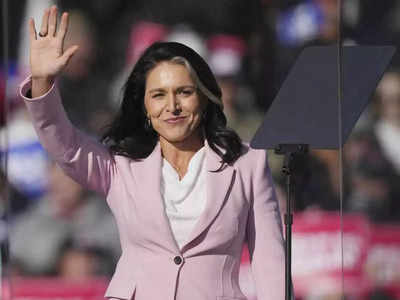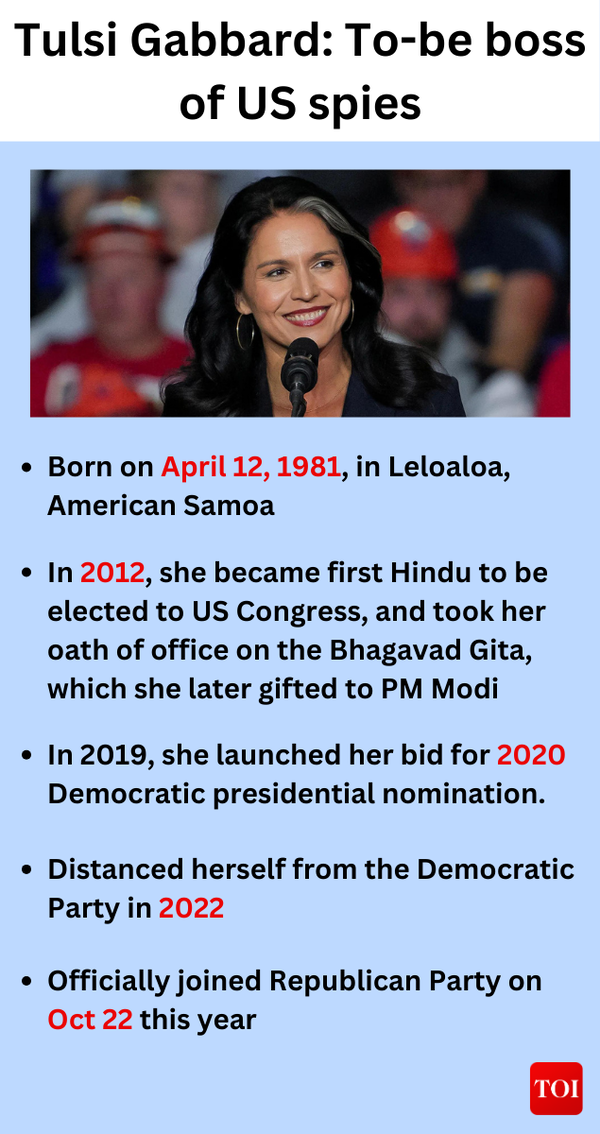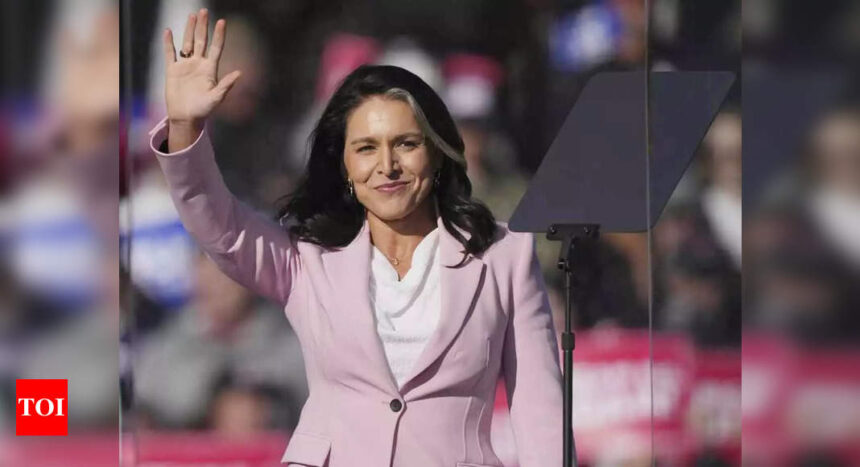
US President-elect Donald Trump’s unexpected choice of Tulsi Gabbard as director of National Intelligence (DNI) has caused considerable concern in the domestic and international intelligence community. This appointment represents an important shift in Trump’s second-term approach, prioritizing personal loyalty over traditional credentials.
Driving news
- Gabbard, a former Democratic congresswoman from Hawaii, became a prominent figure for her independent stance, military service, and unorthodox foreign policy.
- After leaving the Democratic Party in 2022 amid accusations of being a “Russian asset” and criticism of his anti-interventionist views, he later aligned himself with Trump and became a supporter of the “America First” doctrine.
- Gabbard’s path to the DNI nomination represents a shift from a progressive Democratic star to a Republican-aligned figure. His early political career saw him champion non-interventionist policies and endorse Senator Bernie Sanders in 2016, which earned him a following among anti-war liberals. However, his criticism of US military strategy, particularly in the Middle East, has made him a rival of the Democratic Party.
- After leaving Congress in 2021, he moved to conservative media and platforms, criticizing what he called the Democratic Party’s “elitist cabal of warmongers”. Gabbard’s rhetoric resonated with Trump’s base, and he gradually became a prominent figure in the political sphere. Her appearances with figures like Robert F Kennedy Jr, who endorsed Trump after rejecting his own Democratic primary bid, further accelerated her transition.
Zoom in
- Now slated for the DNI role, Gabbard will oversee 18 intelligence agencies and play a critical role in advising the president on national security.
- The DNI position, established in 2004 after the 9/11 attacks, is designed to streamline intelligence coordination and prevent gaps that allow major security threats to emerge.
- According to Chidanand Rajghatta’s report, “the director of national intelligence serves as the head of the US intelligence community, oversees and directs the implementation of the National Intelligence Program and serves as the principal advisor to the President, the National Security Council, and the Homeland Security Council for intelligence issues related to national security.”
- DNI oversees agencies such as the CIA, NSA, and FBI, and is responsible for producing the President’s Daily Brief (PDB), a comprehensive intelligence report on global hotspots.
- By nominating Gabbard, Trump has signaled his intention to reshape the intelligence community, which has long been viewed with suspicion and is part of a “deep state” resistant to his leadership.

Why is it important?
- Trump’s surprise nomination of Tulsi Gabbard as director of National Intelligence (DNI) has caused unease in the domestic and international intelligence community.
- Gabbard’s controversial stance, particularly her views on Russian and US military intervention, appears to have the potential to disrupt the stability and functioning of the US intelligence apparatus.
- Gabbard’s nomination has raised red flags among US allies, particularly in the Five Eyes intelligence alliance, which includes the US, Britain, Canada, Australia, and New Zealand.
- Western intelligence sources have warned of a potential “slowdown in intelligence sharing” if Gabbard’s pro-Russian leanings shape US intelligence policy.
- “Choosing Gabbard for this role is an affront to the intelligence establishment,” Douglas London, a veteran CIA operations officer, told the Wall Street Journal. “Will they form intel? Will they form and filter?” he asked.
Between the lines: Loyalty through experience
- Trump’s selection of Gabbard fits a broader pattern of personnel selection for the incoming administration, favoring loyalty over conventional expertise. In his first term, Trump often clashed with intelligence officials who he considered damaging his agenda. Figures like former FBI Director James Comey and ex-Director of National Intelligence James Clapper are public enemies that add to Trump’s distrust of the intelligence community.
- By appointing Gabbard, who has echoed Trump’s criticism of the “deep state,” the president-elect doubled down on his intention to align his national security leadership with his worldview.
What he said
- Concerns from intelligence circles: Abigail Spanberger, a Democratic lawmaker and former CIA official, expressed concern about Gabbard’s nomination. “Not only are they unprepared and unqualified, but they peddle conspiracy theories and favor dictators like Bashar al-Assad and
Vladimir Putin ” Spanberger noted, highlighting the fear that Gabbard’s bias could skew intelligence assessments. - Former national security adviser John Bolton, now a Trump critic, quipped, “I think this is the worst cabinet-level appointment in history until we hear about Matt Gaetz’s appointment.”
- As the Telegraph reports, Sir Richard Dearlove, the former head of Britain’s MI6, described Gabbard’s appointment as “a maverick move that defies intelligence orthodoxy.” While European allies are known for their adaptability, the appointment is a confidence booster. “We have to deal with what we have,” a European defense official told Reuters. “We’ll be careful.”
Any
- The Senate confirmation process is set to be controversial. Despite the Republican majority, there are bipartisan concerns about Gabbard’s qualifications and ideological leanings. Former CIA officials and intelligence analysts have warned that Gabbard’s alignment with adversary countries, particularly her sympathetic remarks toward Russia’s “legitimate security concerns” about Ukraine, could hinder her ability to provide unbiased intelligence.
- For many Republicans, his nomination is a litmus test of support for Trump’s first model of governance. While allies like Senator Marco Rubio called it a “revolutionary choice,” others, like Senator John Cornyn, remained wary. “We will do our job, review the nominees, and make a decision. It’s a constitutional responsibility,” he said, stressing the potentially controversial nature of Gabbard’s confirmation process.
- As the Senate prepares for what promises to be a polarizing hearing, intelligence professionals are left wondering what Gabbard’s position means. Will he craft an intelligence report to echo Trump’s worldview? Will America’s enemies exploit the chaos it feels, due to internal divisions?
- Although Trump’s supporters in the Senate are likely to support his nomination, some key Republican figures may resist. Analysts noted that this could be a test of whether Trump’s hold on the GOP will overcome concerns about national security.
(With input from agencies)




